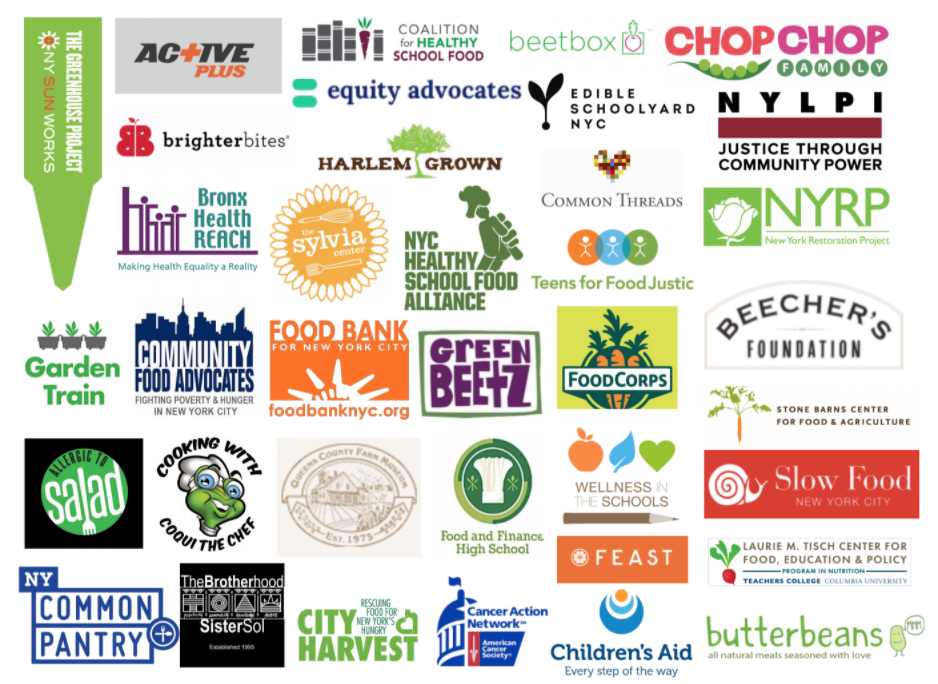NEW YORK, NY – With the COVID-19 crisis highlighting how dangerous diet-related diseases can be, today 37 members of the Food Ed Coalition sent a letter to the New York City Council Speaker Corey Johnson, and Councilmembers Mark Levine, Mark Treyger, and Daniel Dromm, urging the City Council to include funding for the Food Ed Hub in the FY2021 budget. Food Ed Coalition members are public health, education, sustainability, social justice, and youth-serving organizations doing critical frontline work during the pandemic. Like the communities they serve, these organizations are facing dire financial futures. Funding the Food Ed Hub will help ensure communities are stronger, safer, and healthier moving forward.
“We, the organizations that the Food Ed Hub supports, continue to work with the most vulnerable communities in our City to provide meals, deliver groceries, communicate about available food assistance, and offer virtual education sessions,” says the letter. “In the face of increasing financial pressures, we cannot afford to lose a critical resource designed to maximize our impact, increase our efficiency, and ensure that services are equitably distributed. Now, more than ever, we cannot afford to lose the Food Ed Hub.”
Click here to view the full letter.
“The NYC Food Ed Hub has provided Children’s Aid and other food-focused organizations with vital support during the COVID crisis. The Food Ed Hub response to the crisis was immediate and highly effective: they have consistently convened organizations of the Food Ed Coalition, providing space for crucial resource-sharing, including much-needed COVID-related funding opportunities,” said Whitney Reuling, Director of Food and Nutrition Programs, Children’s Aid. “Their support has enabled Children’s Aid to more effectively and immediately address the needs of our communities during this difficult time.”
“The word healthy certainly takes on more meaning today, and health and wellness have become ever more important. New Yorkers with high rates of obesity and diabetes are more vulnerable to coronavirus. COVID-19 has brought many things to light, among them, that we need to double down on collective action to address health disparities. The Food Ed Hub is an essential resource for organizations like ours, ensuring that we have the information, resources, and organizing opportunities to work together to support New York’s students and families,” - Nancy Easton, Executive Director, Wellness in the Schools.
In FY 2020, the Council invested $250,000 to create a first-of-its-kind Food Ed Hub at the Laurie M. Tisch Center for Food, Education & Policy, in the Program in Nutrition, Teachers College Columbia University. The Food Ed Hub has been a key convener during the COVID-19 crisis, hosting virtual meetings to coordinate COVID-19 responses with its 80 plus Coalition members; sharing food assistance and funding opportunities; conducting research to inform school food policies; and providing tools to support digital food education. Specifically, the Food Ed Hub is:
- Identifying Areas of Need —The Food Ed Hub is collecting data from Coalition members to help them overcome the challenges COVID-19 has created. These include covering COVID-related expenses such as food, overtime pay for frontline workers, personal protective equipment, and digital learning technology. Based on survey results, the Food Ed Hub will to continue to prioritize timely policy updates related to school meals, Pandemic EBT (P-EBT), SNAP, CACFP, and WIC; fundraising support; and peer-to-peer learning.
- Coordinating Frontline Organizations’ Responses—The Food Ed Hub hosts recurring virtual meetings for members, has formed an ad-hoc working group focused on digital learning, and shares food assistance and funding opportunities through the weekly Food Ed Hub newsletter.
- Using Real-Time Research to Inform Policy— The Food Ed Hub is collecting data on how school districts across the country are providing meals during school closures; translating those data into recommendations; and advocating with national, state, and local groups for greater food assistance for New York City students and families. With partners, the Hub is promoting P-EBT to ensure students do not go hungry.
- Supporting Digital Learning—Coalition members need help developing and disseminating digital content, as well as effectively communicating with families. The Hub is launching a digital platform to feature members’ COVID-19 digital content, developing a toolkit to share virtual best practices, and working with the Department of Education to ensure teachers and parents can access quality food education resources.
Groups that signed the letter include:
Active Plus, Allergic to Salad, American Cancer Society Cancer Action Network (ACS CAN), The Beecher’s Foundation, Beetbox, Brighter Bites, The Brotherhood/Sister Sol, Butter Beans, Children’s Aid, City Harvest, ChopChop Family, Inc., Coalition for Healthy School Food, Common Threads, Community Food Advocates, Coqui the Chef, Edible Schoolyard NYC, Equity Advocates, FEAST, Food Bank For New York City, Food Education Fund, FoodCorps New York, Garden Train, Green Beetz, Harlem Grown, Institute for Family Health – Bronx Health REACH, The Laurie M. Tisch Center for Food, Education, and Policy, New York Lawyers for the Public Interest, New York Restoration Project, NY Sun Works, NYC Healthy School Food Alliance, Queens County Farm Museum, Slow Food NYC, Stone Barns Center for Food and Agriculture, The Sylvia Center, Teens for Food Justice, Wellness in the Schools.
